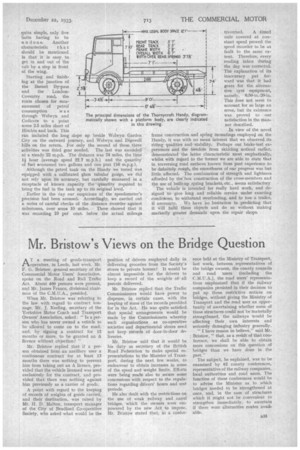Mr. Bristow's Views on the Bridge Question
Page 41

If you've noticed an error in this article please click here to report it so we can fix it.
AT a meeting of goods-transport operators, in Leeds, last week, Mr. F. G. Bristow, general secretary of the Commercial Motor Users! Association, spoke on the Road and Rail Traffic Act. About 400 persons were present, and Mr. James -France, divisional chairman of the C.M.U.A., presided.
When Mr. Bristow was referring to the law with regard to contract tonnage, Mr. J. Keeling, secretary of the Yorkshire Motor Coach and Transport Owners' Association, asked: " Is a person who has never owned a vehicle to be allowed to come on to the road, and, by signing a contract for 12 months or more, to be granted an A licence without objection? "
Mr. Bristow replied that if a person obtained from an ancillary user a continuous contract for at least 12 months there was nothing to prevent him from taking out an A licence, provided that the vehicle licensed was used exclusively for the contract, and provided that there was nothing against him previously as a carrier of goods.
A point with regard to the keeping of records of weights of goods carried, and their destination, was raised by Mr. H. D. Malton, transport manager of the City of Bradford Co-operative Society, who asked what would be the position of drivers employed daily in delivering groceries from the Society's stores to private houses? It would be almost impossible for the drivers to keep a record of the weights ofall parcels delivered.
Mr. Bristow replied that the Traffic Commissioners would have power to dispense, in certain cases, with the keeping of SOrne of the records provided for in the Act. He was quite satisfied that special arrangements would be made by the Commissioners whereby such organizations as co-operative societies and departmental stores need not keep records of door-to-door deliveries.
Mr. Bristow said that it would be his duty as secretary of the British Road Federation to make special representations to the Minister of Transport, during the next few weeks, to endeavour to obtain increases in some of the speed and weight limits. Efforts were being made also to secure some concessions with respect to the regulations regarding drivers' hours and rest periods.
He also dealt with the restrictions on the use of weak railway and canal bridges, which the owners were empowered by the new Act to impose. Mr. Bristow stated that, it a confer
ence held at the Ministry of Transport, last week, between representatives of the bridge owners, the county councils and road users (including the C.M.U.A.), the road users' representatives emphasized that if the railway companies persisted in their decision to put up these restrictive notices on bridges, without giving the Ministry of Transport and the road user an opportunity of ascertaining whether some of these structures could not be materially strengthened, the railways would be affecting their own interests and seriously damaging industry generally.
" I have reason to believe," said Mr. Bristow, " that, as a reshlt of that conference, we shall be able to obtain more concessions on this question of bridges than we have done in the past."
The subject, he explained, was to be examined by 62 county conferences, representative of the railway companies, local authorities and road users. The function of these conferences would he to advise the Minister as to which bridges needed to be strengthened at once, and, in the case of structures which it might not be convenient to strengthen immediately, to ascertain if there were alternative routes avail. able.












































































